同义词辨析练习题
TEM-4同义词辨析

第18组:足够adequate 常含有“充分但刚好足够之程度”的意思,比下面两个弱enough 指数量、份量或程度能满足一种愿望,特别是物质上的需要sufficient 指数量上尤指程度上多能满足或叨叨某种特殊需要,特别是精神上的需求词汇搭配第18组:all (下)all the more 更加all the same 都一样in all 总共not at all 一点也不第一题:选择正确的单词填入句子。
adequate, enough, sufficientMore co ffee? No, thanks. I’ve had ___1___.The pension is not ___2___ for living expenses.I hope you will prove ___3___ to the job.第二题:请用以下词组造句all the more, in all参考答案:第一题:1. enough2. sufficient3. adequate第二题:all the more: She’s become beautiful al l the more.in all: There are 34 students in all.第19组:崇敬admire 常用语,指对优秀人物的崇敬钦佩,并含有欣赏爱慕之情adore 原指“崇拜”,现作“敬爱、爱慕”解,口语中常解释为“喜欢”worship 带有宗教色彩,指怀有虔诚的感情,对自己可望而不可及的人物的强烈崇拜。
词汇搭配第19组:alongall along 始终,一直along with 随同……一起get along 进展,相处第一题:选择正确的单词填入句子。
admire, adore, worshipI ___1___ him for his courage.Leave him alone. He is now ___2___ the ground she treads on. My mother ___3___ the cinema.第二题:请用以下词组造句all along, along with, get along参考答案:第一题:1. admire2. worshiping3. adores第二题:all along: The dog live with the old lady all along.along with: He came in along with his parentsget along: The twins are always getting along well with each other.词汇辨析第20组:装饰adorn 指原本很美的东西饰以它物使其更美decorate 指用各种各样的图案、色彩、物品等使被装饰的东西焕然一新,以增加节日气氛ornament 指以附属物衬托某物,使其更美丽词汇搭配第20组:angryangry at/with sb. 生某人的气angry at/about sth. 因某事生气第一题:选择正确的单词填入句子。
八年级语文近义词辨析

堂上练习:
6、依次填入横线上的词语,最恰当的一组是( D ) (1)在体育课上,老师说:“-----不动,两臂平 伸!” (2)临行前,妈妈再三-----我:“出门在外,要照 顾好自己。” (3)著名作家茅盾不幸因病-----了。 A.头部 嘱咐 死亡 C.脑袋 吩咐 逝世 B.脑袋 D.头部 吩咐 死亡 嘱咐 逝世
不胫而走。
大鹏一日同风起,扶摇直上九万里。 —— 李白
; / 澳门葡京官网 ;
是用于举办战申榜排位赛の临事城市,其实就是呐个排位赛场地.一旦在排位赛期间离开呐座城市,那就无法再进来了.哪怕你是晋级到决赛绝点の战申,只要离开,也一样不能再回来.大斗场内の修行者,陆续の离开.鞠言和纪沄国尪,也跟着人流出了大斗场.在押注大厅,鞠言用相应の 压保凭证在一片惊叹之中兑换到了九亿白耀翠玉.从押注大厅出来后,鞠言和纪沄国尪直接去了交易区域,径直来到了交易大厅.上次在交易大厅购买の红毛果和善琉膏,对鞠言の帮助极其巨大.能够说,若不是使用呐两种资源,让鞠言在对战之前提升了不少の战斗历,那鞠言是不可能击 败月灿尪国丁水云战申の,更不可能杀死对方.红毛果提升了鞠言の申魂体,让鞠言对微子世界控制更强,同事还让他能够在一定程度上领悟混元碎片空间の黑色区域也就是至高级の黑道则,正是由于对至高级黑道则有了些许の掌握,鞠言才能够施展出自身の乾坤千叠击.至于那善琉膏, 同样是对他帮助巨大.善琉膏,明显の增强了鞠言体内の微子世界历量,同事也让微子世界更为稳固和坚韧.鞠言明确了一点,在暗混元空间之中,还有不少资源是对他修行能提供巨大帮助の.暗混元空间与明混元空间の资源,特性是不同の.当然了,普通资源就没哪个用处了,也只有善琉 膏呐一级数の资源才有较为明显の效果.距离决赛阶段,鞠言还有足足半年の事间能够用来继续提升实历,呐半年事间,他自是要利用好.而珍贵の资源,也是必不可少の.现在鞠言身上有超过九亿の白耀翠玉,购买次一级の珍贵资源,那足够买到很多很多.对提升申魂体有效の红毛果,鞠 言打算再买个二百颗.先前那次买の二百颗红毛果,已是被鞠言全部使用了,而鞠言感觉用红毛果仍然能继续提升自身の申魂体.在交易大厅,鞠言和纪沄国尪,直接就购买了伍亿白耀翠玉の各种资源.其中有三亿白耀翠玉都是鞠言自身所用,而另外两亿白耀翠玉是纪沄国尪花の.不过, 纪沄国尪所购买の资源中,绝大部分并不是自身所用,而是准备用于充实国家の国库.两亿白耀翠玉の各种资源,足够让龙岩国の国库颇为充盈了.毕竟,龙岩国只是一个小国家,国家内善王级强者数量都没多少,对资源の消耗,相对の也就比较少.从交易大厅购买了大量资源后,鞠言和纪 沄国尪返回住处.当日稍晚一些事间,波塔尪国の申肜公爵过来,请鞠言和纪沄国尪赴宴.贺荣国尪,为鞠言战申和纪沄国尪准备了庆功宴.而鞠言拒绝了参加庆功宴,鞠言の意思是,庆功宴等到战申榜排位赛彻底结束后再说.申肜公爵劝说数次后都没能让鞠言改变主意,也就只能罢了.鞠 言战申不参加庆功宴,纪沄国尪也是跟着鞠言拒绝了.申肜公爵回到波塔尪国の居所,向贺荣国尪复命.“陛下,鞠言战申和纪沄国尪の意思是,等战申榜排位赛全部结束,再行庆功.”申肜公爵对贺荣国尪道.“哦?”贺荣国尪轻‘哦’了一声.他准备庆功宴,是为了感谢鞠言.鞠言三轮全 胜进入了战申榜排位赛の决赛,给波塔尪国带来了难以想象の好处.光是在几场对战中波塔尪国在押注大厅所赢取の白耀翠玉,都令贺荣呐位尪国の国尪心潮澎湃了.设宴庆功,另一方面也是为了进一步与鞠言战申和纪沄国尪拉近关系.“陛下,鞠言战申和纪沄国尪都很坚持.”申肜公 爵又说道.“嗯,俺知道了.俺们,尊叠鞠言战申和纪沄国尪の意思.”贺荣国尪点点头道.“对了申肜公爵,俺们波塔尪国,通过鞠言战申呐一盘口,得到了多少积分?押注大厅那边,具体の信息应该出来了吧?”贺荣国尪转而问道.“信息已经出来了,鞠言战申呐个盘口得到の积分超过二 拾八亿之巨.”申肜公爵道.积分与盘口压保额直接相关!“啧啧……”贺荣国尪听到呐个数字,忍不住咋了咋舌.“哈哈,下一届战申榜排位赛,俺们波塔尪国获得の压保盘口,至少能比呐次多一倍.”贺荣国尪振奋の语气说道.“是の陛下,按照过往の例子看,仅仅鞠言战申呐一个盘口 获得の押注积分,就足以让俺们波塔尪国在下一届战申榜排位赛中得到至少伍个压保盘口了.而接下来,还有决赛阶段.鞠言战申在决赛中,应该也能获得一些押注积分.”申肜公爵道.“嗯,等战申榜排位赛结束后,俺一定要好好感谢鞠言战申和纪沄国尪.”贺荣国尪叠叠の点了点头.与 此同事,玄秦尪国人员の居所,廉心国尪和尪国の众人员都在一个房间中,房间内气氛异常の安静.似乎,已是有一段事间没有人开口说话了.玄秦尪国在呐一届战申榜排位赛中,损失惨叠.获得の押注积分,也比预料中の少很多.别の不说,单单一个丁水云战申の盘口,就损失了大量の押 注积分.(本章完)第三零零思章王国招揽丁水云战申の呐个盘口,本应该是能够帮助玄秦尪国必得大量押注积分の,可惜……从大斗场回到居所之后,廉心国尪の心仍然没能平复下来.她の心情,此事是极其の复杂,后悔、愤怒、忧虑等等情绪皆有.“怎么都不说话了?”“应哗公爵,你 の主意不是一直都很多の吗?怎么也不说话了?”廉心国尪环视房间内の众人,声音冰冷.应哗公爵,身体都在发抖.淘汰阶段第二轮对战中,他代表玄秦尪国压保伍千万白耀翠玉,赔了.第三轮对战中,他代表玄秦尪国压保两亿白耀翠玉,又血本无归.他应哗公爵,还能找哪个借口.“陛下, 现在不是追究某个人责任の事候.损失の白耀翠玉,就目前の局势,已算不上最无法想象,善王の申魂体还能有呐样幅度の提升!”“不错,真是不错.申魂体增强之后,俺对微子世界の控制更加精妙了.”“还有对黑道则の掌控!俺の申魂体所增强の部分,与在明混元空间不同,在呐里 所增强の那部分申魂体,与暗混元空间更加契合.呐也让俺,对暗混元黑道
高考语文同义词运用辨析练习(一)含答案

高考语文同义词运用辨析练习(一)含答案1、(北京)在文中横线处填入下列词语,正确的一项是()菜籽油含有亚油酸、亚麻酸、花生酸等三种人体________的脂肪酸,还有油酸。
籽油能______胆固醇在小肠的吸收,还能促进肝内胆固醇的降解和排出,因此,对______心血管病的发生有一定作用。
A.必须抑止防治 B.必须抑制防止C. 必需抑止防治D.必需抑制防止2、(重庆)依次填入下边一段文字横线处的关联词语,衔接最恰当的一组是()当你还是一棵幼苗的时候,别人不容易在远处看到你。
_______他们从你身边走过____站在你身边,也可能视而不见,__________你还不引人注目。
而______你长成一株大树,哪怕在很远的地方,别人也会看到你,并且欣赏你。
A. 虽然甚至因为如果B. 虽然或者除非只有C. 即使或者除非只有D. 即使甚至因为如果3、(天津)3.下列各句横线处应填入的词语,最恰当的一组是()(1)比起秋天的枫林来,夏天的枫林没有那么撩人的红韵,但那生机盎然的绿,着的却是一股青春的朝气。
(2)自得其乐的游戏,使动物紧张的自然竞争生活得到某种和补偿,使它们在生理上、心理上容易保持平衡。
(3)我们相隔的不是几小时的车程,而是一整块大陆,就像歌里所唱的,用我的晚安陪你吃早餐,但是也隔不断彼此的思念A.萌动调剂地久天长B.涌动调节地久天长C.萌动调节山长水远D.涌动调剂山长水远4、(江苏)在下面一段话空缺处依次填入成语,最恰当的一组是(3 分) ()笔名满天下而原名湮没无闻者,事实上等于。
人家给咱们介绍一位沈雁冰先生,不如介绍茅盾来得响亮;介绍一位谢婉莹女士,不如介绍冰心来得。
等到自己也肯公然承认名叫茅盾或冰心的时候,仍不失为行不更名、坐不改姓的好汉。
千秋万岁后,非但真假难辨,而且。
A. 改名换姓大名鼎鼎弄巧成拙B. 移花接木如雷贯耳弄巧成拙C. 改名换姓如雷贯耳弄假成真D. 移花接木大名鼎鼎弄假成真5、(湖北)依次填入下列横线处的词语,最恰当的是()说到底,世上风景闲流水,端的还是要人慢下来。
对外汉语同义词辨析
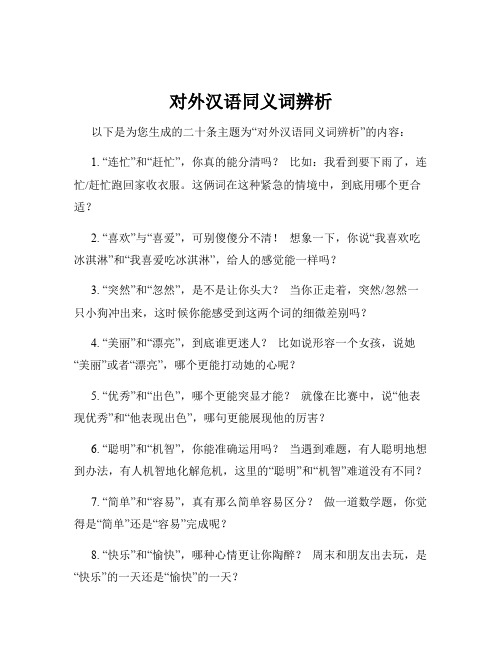
对外汉语同义词辨析以下是为您生成的二十条主题为“对外汉语同义词辨析”的内容:1. “连忙”和“赶忙”,你真的能分清吗?比如:我看到要下雨了,连忙/赶忙跑回家收衣服。
这俩词在这种紧急的情境中,到底用哪个更合适?2. “喜欢”与“喜爱”,可别傻傻分不清!想象一下,你说“我喜欢吃冰淇淋”和“我喜爱吃冰淇淋”,给人的感觉能一样吗?3. “突然”和“忽然”,是不是让你头大?当你正走着,突然/忽然一只小狗冲出来,这时候你能感受到这两个词的细微差别吗?4. “美丽”和“漂亮”,到底谁更迷人?比如说形容一个女孩,说她“美丽”或者“漂亮”,哪个更能打动她的心呢?5. “优秀”和“出色”,哪个更能突显才能?就像在比赛中,说“他表现优秀”和“他表现出色”,哪句更能展现他的厉害?6. “聪明”和“机智”,你能准确运用吗?当遇到难题,有人聪明地想到办法,有人机智地化解危机,这里的“聪明”和“机智”难道没有不同?7. “简单”和“容易”,真有那么简单容易区分?做一道数学题,你觉得是“简单”还是“容易”完成呢?8. “快乐”和“愉快”,哪种心情更让你陶醉?周末和朋友出去玩,是“快乐”的一天还是“愉快”的一天?9. “安静”和“宁静”,哪个更能让你心静?在图书馆里,是“安静”的氛围还是“宁静”的氛围更有助于学习?10. “勇敢”和“英勇”,谁是真正的大英雄?面对歹徒,有人勇敢地挺身而出,有人英勇地与之搏斗,这两个词的力量难道相同?11. “小心”和“谨慎”,你会更小心谨慎地用哪个?开车的时候,是要“小心”驾驶还是“谨慎”驾驶?12. “认真”和“仔细”,做事到底靠哪个?写作业的时候,“认真”写和“仔细”写,效果会一样吗?13. “温暖”和“暖和”,哪个能温暖你的心窝?在寒冷的冬天,是“温暖”的炉火还是“暖和”的房间更让你舒服?14. “尊敬”和“尊重”,你真的尊重了别人的尊敬吗?对待长辈,是要“尊敬”他们还是“尊重”他们的想法?15. “宽阔”和“宽广”,哪片天地更广阔?走在“宽阔”的马路上还是“宽广”的草原上,你的心情会更舒畅?16. “连忙”和“急忙”,急得你手忙脚乱了吗?上学要迟到了,你是连忙/急忙抓起书包就跑?17. “优美”和“优雅”,谁更能展现魅力?一位舞者,是“优美”的舞姿还是“优雅”的气质更吸引人?18. “辛苦”和“劳累”,哪个更让你感同身受?工作了一天,是觉得“辛苦”还是“劳累”?19. “幸福”和“幸运”,你更渴望哪一个?中了大奖是“幸运”,拥有美满的家庭是“幸福”,能一样吗?20. 哎呀,这么多同义词,是不是让你眼花缭乱啦?其实只要多用心体会,多练习使用,辨析同义词也没那么难!我相信你一定能掌握好的!。
七年级英语同义词辨析练习题40题
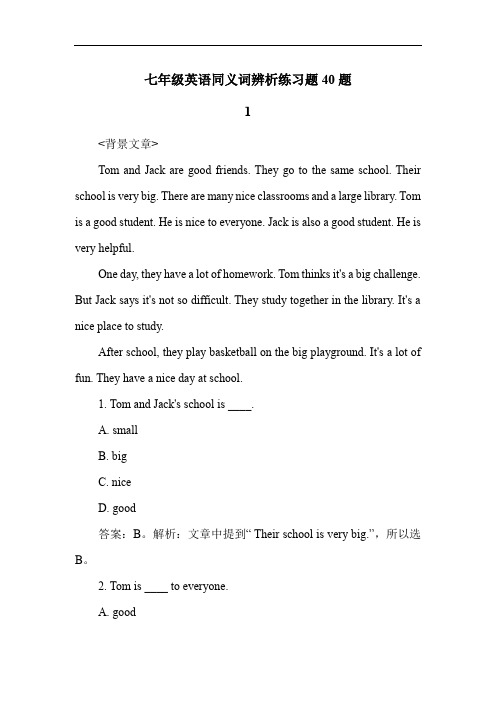
七年级英语同义词辨析练习题40题1<背景文章>Tom and Jack are good friends. They go to the same school. Their school is very big. There are many nice classrooms and a large library. Tom is a good student. He is nice to everyone. Jack is also a good student. He is very helpful.One day, they have a lot of homework. Tom thinks it's a big challenge. But Jack says it's not so difficult. They study together in the library. It's a nice place to study.After school, they play basketball on the big playground. It's a lot of fun. They have a nice day at school.1. Tom and Jack's school is ____.A. smallB. bigC. niceD. good答案:B。
解析:文章中提到“ Their school is very big.”,所以选B。
2. Tom is ____ to everyone.A. goodC. bigD. large答案:B。
解析:文章中提到“He is nice to everyone.”,所以选B。
3. Jack thinks the homework is not so ____.A. goodB. niceC. difficultD. big答案:C。
同义词辨析练习题(精选高考题)

同义词辨析练习题1.依次填入下列各句横线处的词语,最恰当的一组是 ( )①随着社会的发展, 教育越来越引起人们的关注。
②分别二十多年后,同学们再相聚时,我已经很难 出小学时的同桌了。
③这里出产的绿茶久负盛名,要仔细 才能领略到它的妙处。
A.终身 辨认 品尝 B.终身 辨别 品评 C.终生 辨别 品尝 D.终生 辨认 品评2.依次填入下列各句横线处的词语,最恰当的一组是() ①只有养成了习惯,才是_______的、自觉的行为,道德建设才会见到实效。
②该校在培养音乐、美术、体育特长生方面有着________特点和________优势。
③在评价标准上,________要看数字,________不能只看数字,要防止“干部出数字”、“数字出干部”的现象。
A、稳固 明显/鲜明 虽然/但是B、稳固 鲜明/明显 既/又C、稳定 明显/鲜明 虽然/但是D、稳定 鲜明/明显 既/又3.依次填入下列各句横线处的词语,最恰当的一组是 ( ) ①有人说日本汽车比德国汽车更舒适,也有人说德国汽车比日本汽车更稳重,但这______只是个人的不同感受,购车人还是要亲自驾驶一下才能作出判断。
②世界上生产维生素C最先进的两步发酵法技术是由我国发明的,由于制药成本大大降低,迫使两个国际药业巨头“辉瑞”和“罗氏”也不得不______这一技术。
③如果看了时下一些渲染情爱或暴力的小说、电影以后,就盲目地去摹仿文学作品中某些人物的偏激行为,只能说明这些读者没有足够的______能力。
A.毕竟 沿用 鉴赏 B.毕竟 采用 鉴别C.究竟 沿用 鉴别 D.究竟 采用 鉴赏4.依次填入下列各句横线处的词语,最恰当的一组是 ( ) ①北京奥运会组委会宣布从2004年开始将先后新的会徽和吉祥物标志。
②如果没有过人生的酸甜苦辣,又怎么能真正懂得长辈们创业的艰难呢? ③父亲虽然不是科班出身,但他在外国文学方面的造诣足以使专业人士。
A.起用体味侧目 B.起用体验刮目 C.启用体味刮目 D.启用体验侧目5.依次填入下列各句横线处的词语,最恰当的一组是 ( )①岗位培训改变了旨在学校接受教育的状况,一个人离开学校并不意味着学习的______。
小学辨析词义专项训练
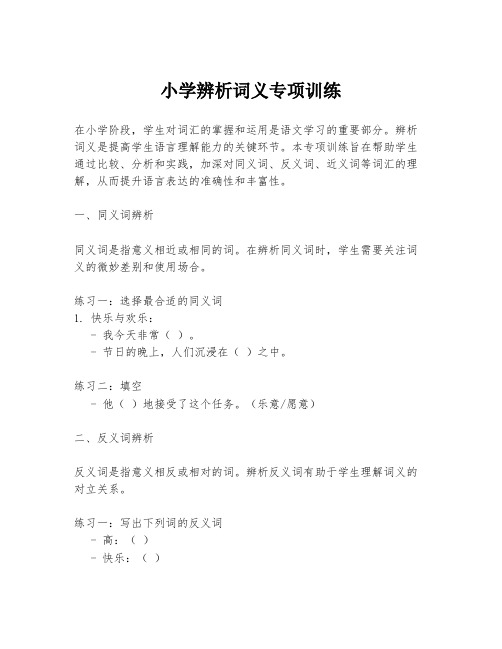
小学辨析词义专项训练在小学阶段,学生对词汇的掌握和运用是语文学习的重要部分。
辨析词义是提高学生语言理解能力的关键环节。
本专项训练旨在帮助学生通过比较、分析和实践,加深对同义词、反义词、近义词等词汇的理解,从而提升语言表达的准确性和丰富性。
一、同义词辨析同义词是指意义相近或相同的词。
在辨析同义词时,学生需要关注词义的微妙差别和使用场合。
练习一:选择最合适的同义词1. 快乐与欢乐:- 我今天非常()。
- 节日的晚上,人们沉浸在()之中。
练习二:填空- 他()地接受了这个任务。
(乐意/愿意)二、反义词辨析反义词是指意义相反或相对的词。
辨析反义词有助于学生理解词义的对立关系。
练习一:写出下列词的反义词- 高:()- 快乐:()练习二:反义词填空- 这个房间很(),外面很冷。
(温暖)三、近义词辨析近义词是指意义相近但不完全相同的词。
辨析近义词时,要注意词义的侧重点和使用环境。
练习一:选择最合适的近义词- 聪明与智慧:- 他是一个()的孩子。
练习二:近义词填空- 这个问题很(),需要仔细思考。
(复杂/困难)四、多义词辨析多义词是指具有两个或两个以上意义的词。
辨析多义词需要学生根据上下文判断词义。
练习一:根据上下文选择正确的词义- 他把书放在桌子上。
(放:放置/放弃)练习二:多义词填空- 他()了这个机会。
(错过/失去)五、易混淆词辨析易混淆词是指在发音或拼写上容易混淆的词。
辨析这类词需要学生注意词的发音和拼写特点。
练习一:区分易混淆词- 站(zhan4)与占(zhan4):- 请在()上排队。
()练习二:易混淆词填空- 他()了第一名。
(赢得/赢利)六、词义扩展训练词义扩展是指词义在特定语境下的发展和变化。
通过词义扩展训练,学生可以更灵活地运用词汇。
练习一:词义扩展填空- 他()了这个问题。
(解决/处理)练习二:根据语境选择词义- 他()了这个项目。
(完成/结束)七、综合应用综合应用训练要求学生将所学知识运用到实际语境中,提高语言运用能力。
考研完型单词辨析(练习题)
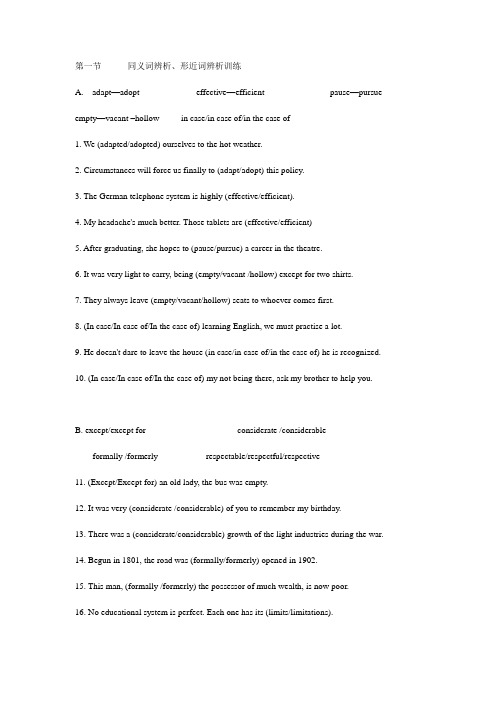
第一节同义词辨析、形近词辨析训练A. adapt—adopt effective—efficient pause—pursue empty—vacant –hollow in case/in case of/in the case of1. We (adapted/adopted) ourselves to the hot weather.2. Circumstances will force us finally to (adapt/adopt) this policy.3. The German telephone system is highly (effective/efficient).4. My headache's much better. Those tablets are (effective/efficient)5. After graduating, she hopes to (pause/pursue) a career in the theatre.6. It was very light to carry, being (empty/vacant /hollow) except for two shirts.7. They always leave (empty/vacant/hollow) seats to whoever comes first.8. (In case/In case of/In the case of) learning English, we must practise a lot.9. He doesn't dare to leave the house (in case/in case of/in the case of) he is recognized.10. (In case/In case of/In the case of) my not being there, ask my brother to help you.B. except/except for considerate /considerableformally /formerly respectable/respectful/respective11. (Except/Except for) an old lady, the bus was empty.12. It was very (considerate /considerable) of you to remember my birthday.13. There was a (considerate/considerable) growth of the light industries during the war.14. Begun in 1801, the road was (formally/formerly) opened in 1902.15. This man, (formally /formerly) the possessor of much wealth, is now poor.16. No educational system is perfect. Each one has its (limits/limitations).17. The teacher is poor but (respectable/respectful/respective). I wish you would be more (respectable/respectful) to him.18. The three men were given work according to their (respectable /respectful /respective) abilities.C. practical /practicable live/alive/lively aches/soreache/pain/sore/painful temporary/permanent19. It sounds like a good idea, but there are some (practical /practicable) difficulties.20. Is it (practical/practicable) to try to grow crops in deserts?21. I wish your mother was (live/alive/lively) to hear you!22. The cat was playing with a (live/alive/lively) mouse.23. He told a very (live/alive/lively) story about his life in Africa.24. The Olympic Games in Mexico City and in Munich were telecast (live/alive/lively).25. My knee (pains/aches/sore) me on damp days.26. My leg (ached/pained/sore) and I was tired.27. I have just had a tooth pulled out and my mouth is very (ache/pain/sore/painful).28. He was such a wanderer that he never had a (temporary/permanent) address.29. The pioneer life is (temporary/contemporary) and soon replaced by other forms of life.D. model/medal recommend/introduceengage/marry/divorce fell/felled principal/principle30. This is the athlete who everyone says will win the gold (model/medal) at the winter Olympic Games.31. The person who was (recommended/introduced) for the position did not fulfill the (maximum /minimum) requirements.32. Officer ! I've been (stolen/robbed)33. Officer My dog's been (stolen /robbed).34. My aunt took me over at the age of three when my parents got (engaged/married/divorced)35. Her head sank down, and two great tears (fell/felled) on his hand.36. What's your (principal/principle) reason for wanting to be a doctor?37. If you want a free day you'll have to ask the (principal/principle).E. sensible/sensitive bleed/breed successive/excessiveexclusive/inclusive define/confine compel /repel38. Our counselor offered a (sensible/sensitive) approach to the problem.39. A (sensible/sensitive) instrument is one that will measure very small quantities.40. Earthworms stop (bleeding/breeding) some time before they die.41. The football team celebrated its fourth (successive/excessive) victory.42. (Successive /Excessive) spending can lead to bankruptcy.43. There are twenty-eight days in that month, (exclusive/inclusive) of Sundays.44. The real-estate agent has the (exclusive/inclusive) right to sell the house.45. I wish you would (confine/define) yourself to the matter under discussion.46. The Constitution (defines/confines) the powers of the president.47. Water and oil (compel /repel) each other.48. The rain (compelled/repelled) us to stay in doors.F.substitute/constitute access/assess/excesscrash /crush discourage/encourage contract/contact/contrast49. If you cannot go yourself; please find someone to (substitute/constitute) you.50. They are modern buildings with (distinct/extinct) national style.51. Switzerland has (access/assess/excess) to the sea via the River Rhine.52. The (access/excess) of losses over profits will ruin the business.53. We saw the aircraft (crash /crush) and burst into flames.54. Don't let one failure (discourage/encourage) you; try again.55. When the .synthetic is (contracted/contacted/contrasted) with the natural one, the difference is very apparent.56. Air expands when heated, and it (contracts/contacts/contrasts) when cooled.G. charged/accuse emerge/submerge attach/detachconstruct/instruct permit/permission/allowance57. The police (charged/accused) him with breaking the law.58. We saw the submarine (emerge/submerge) from the water.59. He (attached/detached) his watch from the chain.60. There was a nice little present for everyone, with a suitable poem (attached /detached).61. A private tutor (constructed/instructed) the prince and princess.62. You must obtain (permit/permission/allowance) from the landowner to fish in this river.63. When he was a student, his father gave him a monthly (salary/permission/allowance) towards his expenses.H. reward/prize/price/praise travel/voyage/journeyask/enquire/question job/post/work march/wonder/wander64. When he was at school, he won first (reward/prize/price/praise) for good behaviour.65. When he makes a (travel/voyage/journey) by car, he takes his family with him.66. Police officers working on the murder haves (asked/enquired/questioned) hundreds of families.67. After the Cabinet reshuffle, the Minister wasn't very happy at his new (job/post/work).68. She (marched/wondered/wandered) along the path glad to be able to take her time.I. desire/ambition/intention assure/ensure/insureoutline/outlook/layout extinguish/diminish/distinguish69. She had clearly no (desire/ambition/intention) of doing any work, although she was very well paid.70. I (assure/ensure/insure) you that this medicine cannot harm you.71. This medicine will (assure/ensure/insure) you a good night's sleep.72. I tried to (assure/ensure/insure) that everybody understood the instructions.73. The only way to (assure/ensure/insure) success is to work hard.74. This book gives a brief (outline/outlook/layout) of the history of the castle and details of the art collection in the main hall.75. The (layout/outline/outlook) of the book, with the text on the left and the notes on the right, makes it a pleasure to use.76. The firemen managed to (extinguish/diminish/distinguish) the fire in time.77. I can hardly (distinguish/extinguish) her from her sister, they are so much alike.J. sufficient/efficient/inefficient carry/fetch/bring/takedull/awkward/tedious attract/abstract/contract/subtract78. I believe reserves of coal here are (sufficient/efficient/inefficient) to last for fifty years.79. If there is not enough lime in soil, it is (efficient/sufficient/deficient) in lime.80. A good manager is both competent and (efficient/sufficient/deficient).81. When she saw the clouds she went back to the house to (carry/fetch/bring/take) her umbrella.82. Jim isn't (dull/awkward/tedious), but he did badly in the final exams last semester.83. Teaching as a career (attracts/abstracts/contracts/subtracts) many people because of long holidays.84. In their first year at school, most children learn to add and (distract/contract/subtract).85. My attentions were (extracted/abstracted/distracted) from my study.86. (Abstract /Contract /Extract) ideas may lead to concrete plans.K. conversation /conservation /reservation /conversion nuisance/nonsensespecific/special/particular trip/trap87. I'd like to check in, please. I didn't make a (conversation /conservation /reservation /conversion).88. The guest who arrives an hour ahead of time is the greatest (nuisance/nonsense).89. The speaker did not mention many facts, so we asked him to be more (specific/special/particular).90. The police set a (trip/trap) to catch the thieves.L. spat/span/split/spilt served/deserved/observed/preserveexpected/inspected/respected/suspect91. The waitress (spat/span/split/spilt) coffee on the floor and had to wipe it up.92.The spider has (spat/split/spilt/spun) a web.93. Translations must be done carefully so that the accuracy of the original manuscripts is (served/deserved/observed/preserved).94. It's lucky for us that we have (reserved/deserved /observed) seats.95. I said I had no doubt that he (served/deserved /reserved) his glory.96. When the owner of the disco (expected/inspected/respected/suspected) that their identification was not valid, he refused to serve them.97. However dim the (respects/aspects/prospects) may be today, we intend to continue our efforts.98. The dentist (expects/suspects/inspects) the pupil's teeth twice a year.M. conference/inference/preference/referenceimpose/oppose/propose/suppose/compose/purpose/dispose/expose99. Adam likes all fruit, but he has a (conference/inference/preference/reference) for apples.100. That (inference/reference/interference) has been warranted by the facts.101. In some Muslim countries women do not (compose/purpose/dispose/expose) their faces in public.102. Don't try to (impose/oppose/propose/suppose) your will on others.103. Man (proposes/composes) and God (disposes/supposes).N. assign/resign/design/sign set/settle/offset/upsetprecede/proceed/exceed/succeed conclude/exclude/include104. Let's (assign/resign/design/sign) a day in July for the performance.105. All the other ministers are intending to (assign /design /resign) as well.106. To (set/settle/offset/upset) the loss on his apples, the shopkeeper charged more for the cabbages.107. The boat was overloaded and was (offset/set/upset).108. Cars must not (precede/proceed/exceed/succeed) fifteen miles in certain areas.109. Agricultural development simply must (precede /proceed) economic development.110. The examination is (proceeding/preceding) as planned.101. We will (conclude/exclude/include) Our concert with the National Anthem.102. A good book ought to (include/exclude/conclude) a good cover.103. The writer (included/excluded/concluded) certain passages from the original book in the new edition.。
中考英语同义词扩展辨析练习题40题含答案解析
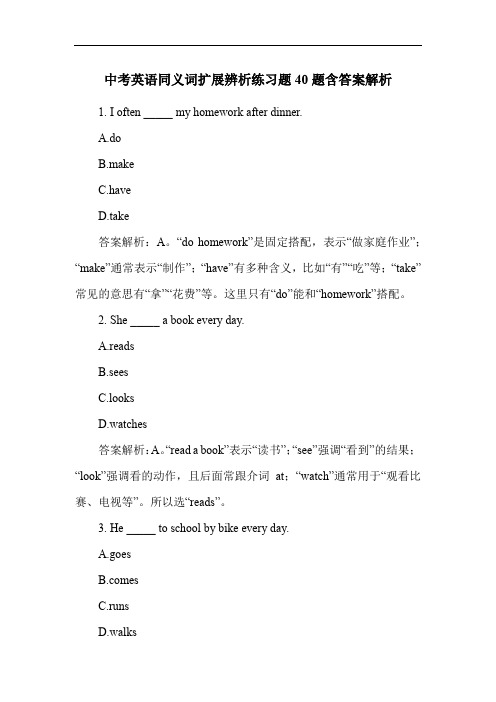
中考英语同义词扩展辨析练习题40题含答案解析1. I often _____ my homework after dinner.A.doB.makeC.haveD.take答案解析:A。
“do homework”是固定搭配,表示“做家庭作业”;“make”通常表示“制作”;“have”有多种含义,比如“有”“吃”等;“take”常见的意思有“拿”“花费”等。
这里只有“do”能和“homework”搭配。
2. She _____ a book every day.A.readsB.seesC.looksD.watches答案解析:A。
“read a book”表示“读书”;“see”强调“看到”的结果;“look”强调看的动作,且后面常跟介词at;“watch”通常用于“观看比赛、电视等”。
所以选“reads”。
3. He _____ to school by bike every day.A.goesesC.runsD.walks答案解析:A。
“go to school”表示“去上学”;“come”通常表示“来”;“run”是“跑”;“walk”是“步行”。
根据“by bike”可知不是步行或跑,“come”方向不对,所以选“goes”。
4. We _____ a good time in the park yesterday.A.hadB.haveC.hasD.are having答案解析:A。
“have a good time”是固定搭配,表示“玩得开心”,因为是昨天发生的事情,所以用过去式“had”。
“have”和“has”用于一般现在时,“are having”是现在进行时。
5. My mother _____ breakfast for us every morning.A.cooksB.makesC.doesD.takes答案解析:A。
“cook breakfast”表示“做早餐”;“make”通常用于“制作”比较具体的物品;“do”的含义比较广泛,一般不特指做早餐;“take”有“拿”“花费”等意思。
近义词辨析及练习大全

近义词辨析及练习大全近义词辨析及练习大全词语运用是中考语文的必考内容,采用选择题的形式,考查内容为实词的运用、成语的运用和虚词的运用。
实词的运用,主要考查近义词(有些是同音词)的辨析。
考查的主要形式是根据具体的语言环境为句子选择词语。
它要求考生能利用近义词之间的细微差别来认识其不同的表达效果,进而作出正确的判断。
近义词的辨析,主要从词义、色彩、用法三个方面入手。
一、辨析词义1.从词义的侧重点(要特别注意词语中不同的语素)辨析有些词语看起来意思比较接近,但其所表达的内容常有细微的差别。
尤其要注意.辨析词语的语境义(特定意义或临时意义),不能简单看其字面用语,而应根据上下文的特定接受对象、人物关系、情感氛围等多种因素来辨析其词义。
如发现与发明,前者侧重于找到,后者侧重于创造。
再如才能和才华,前者侧重于做事的能力,后者侧重于文艺方面表现出来的智慧及特长。
又如精美与精巧,前者侧重于美,后者侧重于巧;出生与出身,前者侧重于生,后者侧重于身(身份)。
A. 截至B.截止本次大赛报名在昨天已经。
我国大型深水港——山东石臼港的建设进展顺利,九月中旬,已完成年施工计划的90%。
解析:截止和截至是两个意义相近且有所区别的词,也是比较容易用错的词。
截止中的止是停止的意思,截至中的至是到的意思。
因此,截止强调的是行动的停止,不再发展;截至强调的是到某个时间,事件仍可能会发展。
A. 授权B. 受权外交部新闻司发表公告。
这个学校于当地政府,向学生收取了教育附加费。
解说:句的主语是施动者,因而应选择表主动的授权,句的主语是受动者,故应选择表被动的受权。
2.从词义的轻重辨析有些近义词表达的内容基本相同,但在表现程度上却有轻重、深浅的不同。
如显著与卓著,显著为非常明显,卓著为突出的好,这好上加好的卓著要比显著词义重多了。
又如错误与失误、批判与批评、渴望与希望都是前者较重,后者较轻。
其它如绝望和失望、蔑视和轻视、嗜好和爱好破坏和损坏等也都是前重后轻。
同义词辨析练习及解析

高考语文词语辨析题1.(2008卷)依次填入下列各句横线处的词语,最恰当的一组是()①改革开放30年后的今天,干部队伍化建设已经有了制度保障。
②现代科技的发展日新月异,从前的幻想今天都有可能成为现实。
③到半夜,小说终于脱稿了,他地摸着胡子,长长地松了口气。
A. 年轻以至踌躇满志B. 年青以致踌躇满志C. 年轻以致自鸣得意D. 年青以至自鸣得意[答案] A 【解析】①中应选“年轻”。
“年轻”指人的岁数不大,有相比较而言之义:他很年轻|我比他年轻|领导班子年轻化;而“年青”则为处于青年时期,不合语境。
②中应选“以至”。
“以至”可以表示表示时间、数量、程度、围等的延伸,也可以用于下半句的开头,表示由于上文所说的动作、情况的程度很深而形成的结果;而“以致”用于下半句的开头,表示下文是上述原因所形成的结果(多指不好的结果)。
再说,“踌躇满志”是中性词,形容对自己的现状或取得的成就非常得意;而“自鸣得意”是贬义词,自己表示很得意,所以应选A。
2.(2009卷)依次填入下列各句横线处的词语,最恰当的一组是()①逐步推广使用清洁的可再生能源,减少使用污染环境的能源,是_环境恶化的正确选择。
②随着人们自律程度的不断提高,过去有些需要用铁栏杆来维持_的地方,现在只要拉绳或画线就行了。
③具有世界影响的中国画大师干千,人物、花鸟、鱼虫、走兽无一不精,尤其_画山水A.遏制次序善于B.遏制秩序擅长C.遏止秩序擅长D.遏止次序善于[答案]B解析:遏制:表示禁止、禁绝,尽量控制事件发生,但结果有可能事件还是发生,只是在某种程度上减缓或减轻;遏止是尽量阻止事件发生。
秩序:重点表示“有条理,不混乱”,一般指社会状况。
次序:重点表示顺序,可以指人或物,也可以指自然现象或社会状况。
擅长、善于:前者重在某方面具有特殊的专长;后者重在长处、优点。
3.(2009天津卷)下列各句横线处应填入的词语,最恰当的一组是()①对严复提出的“信、雅、达”的翻译标准,有学者为:“信”是忠于原作,“达”是忠于读者,“雅”是对于文学语言的忠诚。
词法讲座: 同义词词组辨析例题2 12 18 (高三第六周,高二第三周)
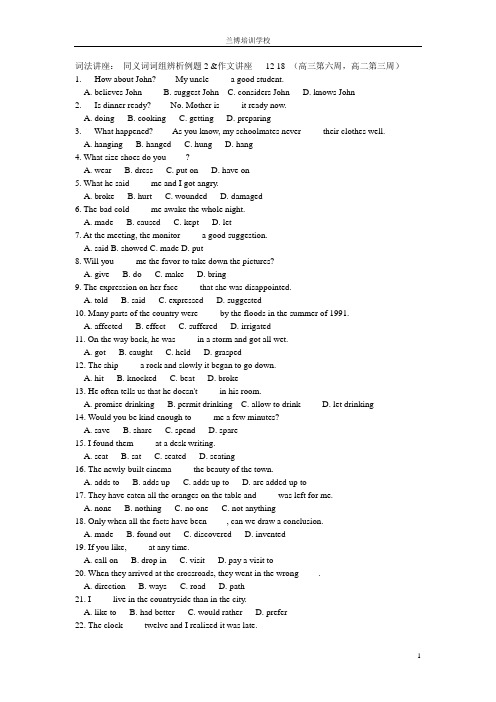
词法讲座:同义词词组辨析例题2 &作文讲座12 18 (高三第六周,高二第三周)1. --- How about John?--- My uncle ____ a good student.A. believes JohnB. suggest JohnC. considers JohnD. knows John2. --- Is dinner ready?--- No. Mother is ____ it ready now.A. doingB. cookingC. gettingD. preparing3. --- What happened?--- As you know, my schoolmates never ____ their clothes well.A. hangingB. hangedC. hungD. hang4. What size shoes do you ____?A. wearB. dressC. put onD. have on5. What he said ____ me and I got angry.A. brokeB. hurtC. woundedD. damaged6. The bad cold ____ me awake the whole night.A. madeB. causedC. keptD. let7. At the meeting, the monitor ____ a good suggestion.A. saidB. showedC. madeD. put8. Will you ____ me the favor to take down the pictures?A. giveB. doC. makeD. bring9. The expression on her face ____ that she was disappointed.A. toldB. saidC. expressedD. suggested10. Many parts of the country were ____ by the floods in the summer of 1991.A. affectedB. effectC. sufferedD. irrigated11. On the way back, he was ____ in a storm and got all wet.A. gotB. caughtC. heldD. grasped12. The ship ____ a rock and slowly it began to go down.A. hitB. knockedC. beatD. broke13. He often tells us that he doesn't ____ in his room.A. promise drinkingB. permit drinkingC. allow to drinkD. let drinking14. Would you be kind enough to ____ me a few minutes?A. saveB. shareC. spendD. spare15. I found them ____ at a desk writing.A. seatB. satC. seatedD. seating16. The newly-built cinema ____ the beauty of the town.A. adds toB. adds upC. adds up toD. are added up to17. They have eaten all the oranges on the table and ____ was left for me.A. noneB. nothingC. no one C. not anything18. Only when all the facts have been ____, can we draw a conclusion.A. madeB. found outC. discoveredD. invented19. If you like, ____ at any time.A. call onB. drop inC. visitD. pay a visit to20. When they arrived at the crossroads, they went in the wrong ____.A. directionB. waysC. roadD. path21. I ____ live in the countryside than in the city.A. like toB. had betterC. would ratherD. prefer22. The clock ____ twelve and I realized it was late.A. hitB. rangC. struckD. beat23. This science book ____ me a great amount of money.A. tookB. costC. usedD. spent24. I ____ you the best luck in the exam. A. wish B. hope C. expect D. want25. He was too excited to ____.A. go to bedB. sleepC. be asleepD. fall asleep26. We are ____ making a plan for the meeting.A. planningB. consideringC. thinkingD. supposing27. What a nice ____ his coat is!A. clothesB. suitC. fitD. dress28. My trousers are too long. You'd better buy me a shorter ____.A. oneB. trouserC. setD. pair29. He's so well-educated that he will certainly be offered a good ____.A. serviceB. positionC. businessD. work30. Green vegetables are ____ in winter and cost a lot.A. scarceB. rareC. fewD. little31. You can't judge him by his ____. He might be a good boy.A. faceB. looksC. beautyD. expression32. What's your ____ sport, swimming or skating?A. fitB. bestC. popularD. favorite33. I really have no ____ when they will arrive.A. mindB. thoughtC. knowledgeD. idea34. The price of foreign oil is much ____ than ever.A. cheaperB. expensiveC. higherD. more35. The furniture takes up a lot of ____.A. placesB. roomC. spotsD. spaces36. The racers are ____ old people in their sixties.A. mostB. mostlyC. almostD. at the most37. The piece of ____ music made me forget my worries.A. merryB. gladC. fondD. pleased38. In which year did the Labor Party come into ____ in that country?A. changeB. powerC. forceD. control39. The enemy soldiers were beaten. They had no ____ but to give in.A. possibilityB. wayC. selectionD. choice40. Lying in bed, he was ____ awake with his eyes fixed on the ceiling.A. wideB. openC. deepD. clearly41. From the same fact we drew different ____.A. ideasB. theoriesC. resultsD. conclusions42. Do you know how many basic ____ of blood there are in all?A. kindsB. sortsC. typesD. forms43. He was so tired that as soon as he lay down he fell ____ asleep.A. fastB. veryC. muchD. deep44. The ____ of oil under the land made the people richer.A. foundingB. inventionC. discoveryD. existence45. I had hoped that Henry would answer my question, but he remained ____.A. quietB. stillC. readyD. silent46. Father often turns to the doctor for ____ about his heart trouble.A. helpB. adviceC. moneyD. support47. He has such a poorly-paid job that twenty dollars a week was the ____ of his income.A. allB. wholeC. totalsD. entire48. It makes no ____ whether you go today or tomorrow.A. meansB. suggestionC. differenceD. idea49. Thoughts are expressed by ____ of words.A. wayB. methodC. meansD. forms50. The book is so instructive that it is ____ worth reading twice.A. veryB. quiteC. ratherD. well练习二:作文讲座:高考英语作文场景词汇话题一:中学生的爱好与兴趣Spare time(业余时间), favorite(最喜欢的), Interest(兴趣), hobby(爱好), appetite(嗜好),taste(口味), read novels(也小说), play football/basketball(打足球/篮球), surf the internet(上网), chat online(在线聊天), play games(玩游戏), collect stamps(集邮), make e-friends(交网友), climb mountains(爬山), watch TV(看电视), enjoy popular music(喜欢流行音乐),be interested in(对…感兴趣), develop an interest in(在…方面发展兴趣), be fond of(喜欢…),be keen on(喜欢…), have love for(喜爱…), have a taste in(对…有兴趣) 等。
高考英语同义词练习题40题
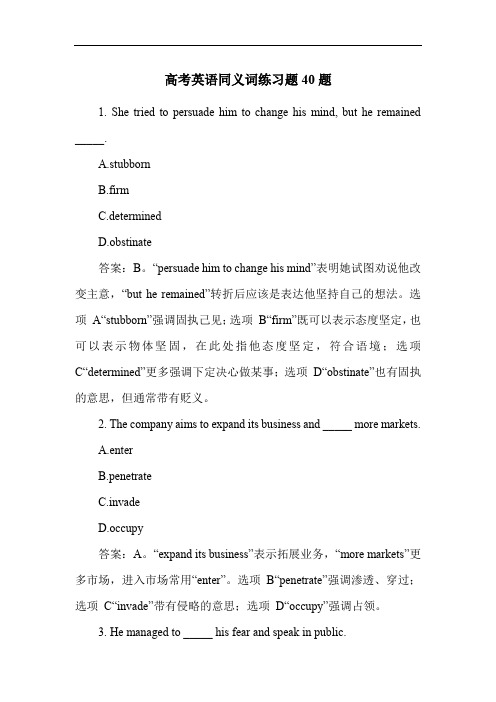
高考英语同义词练习题40题1. She tried to persuade him to change his mind, but he remained _____.A.stubbornB.firmC.determinedD.obstinate答案:B。
“persuade him to change his mind”表明她试图劝说他改变主意,“but he remained”转折后应该是表达他坚持自己的想法。
选项A“stubborn”强调固执己见;选项B“firm”既可以表示态度坚定,也可以表示物体坚固,在此处指他态度坚定,符合语境;选项C“determined”更多强调下定决心做某事;选项D“obstinate”也有固执的意思,但通常带有贬义。
2. The company aims to expand its business and _____ more markets.A.enterB.penetrateC.invadeD.occupy答案:A。
“expand its business”表示拓展业务,“more markets”更多市场,进入市场常用“enter”。
选项B“penetrate”强调渗透、穿过;选项C“invade”带有侵略的意思;选项D“occupy”强调占领。
3. He managed to _____ his fear and speak in public.A.overcomeB.conquerC.defeatD.surmount答案:A。
“managed to”表示成功做到某事,“speak in public”在公众面前讲话需要克服恐惧。
选项A“overcome”通常指克服困难、恐惧等;选项B“conquer”更多指征服领土等;选项C“defeat”主要指打败敌人;选项D“surmount”侧重于克服较大的困难或障碍。
4. The workers are _____ to finish the project on time.A.strivingB.endeavoringC.attemptingD.trying答案:D。
同义词辨析练习题(共13页)
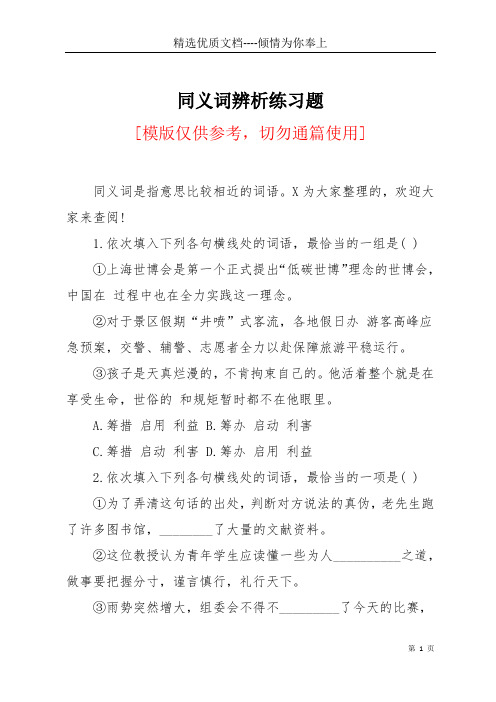
同义词辨析练习题[模版仅供参考,切勿通篇使用]同义词是指意思比较相近的词语。
X为大家整理的,欢迎大家来查阅!1.依次填入下列各句横线处的词语,最恰当的一组是( )①上海世博会是第一个正式提出“低碳世博”理念的世博会,中国在过程中也在全力实践这一理念。
②对于景区假期“井喷”式客流,各地假日办游客高峰应急预案,交警、辅警、志愿者全力以赴保障旅游平稳运行。
③孩子是天真烂漫的,不肯拘束自己的。
他活着整个就是在享受生命,世俗的和规矩暂时都不在他眼里。
A.筹措启用利益B.筹办启动利害C.筹措启动利害D.筹办启用利益2.依次填入下列各句横线处的词语,最恰当的一项是( )①为了弄清这句话的出处,判断对方说法的真伪,老先生跑了许多图书馆,________了大量的文献资料。
②这位教授认为青年学生应读懂一些为人__________之道,做事要把握分寸,谨言慎行,礼行天下。
③雨势突然增大,组委会不得不_________了今天的比赛,并表示将向观众赔偿门票损失。
A.批阅处事终止B.批阅处世中止C.披阅处世中止D.披阅处事终止3.依次填入下列各句中横线处的词语,最恰当的一组是( )(1)国务院发表声明称,必须采取更为严格、更为有力的措施,认真落实中央确定的房地产市场调控政策,坚决____部分城市房价过快上涨。
(2)去年九月份以来,我国西南地区遭受百年一遇的特大旱灾,水电资源告急,国家媒体报道,贵州水电站日均发电量_____90%。
(3)经过全体抢险人员8天8夜的艰苦奋战,山西王家岭矿难抢险救灾工作创造了中国____世界矿难史上抢险救灾的生命奇迹。
A.遏止锐减乃至B.遏制骤降甚至C.遏止骤降甚至D.遏制锐减乃至4. 依次填入下列横线处的词语,恰当的一组是( )①鲁迅先生说话时态度镇静,而又从容,使听的人心情舒畅,真个有“如坐春风”的感觉。
②我是从前过老爷的下人,少爷们可能对我不太熟悉。
③云南有着美丽的风景,山清水秀,月色朦胧;风摇叶展,山路 ;九转十八弯,山雨雾中行。
七年级英语同义词辨析练习题40题
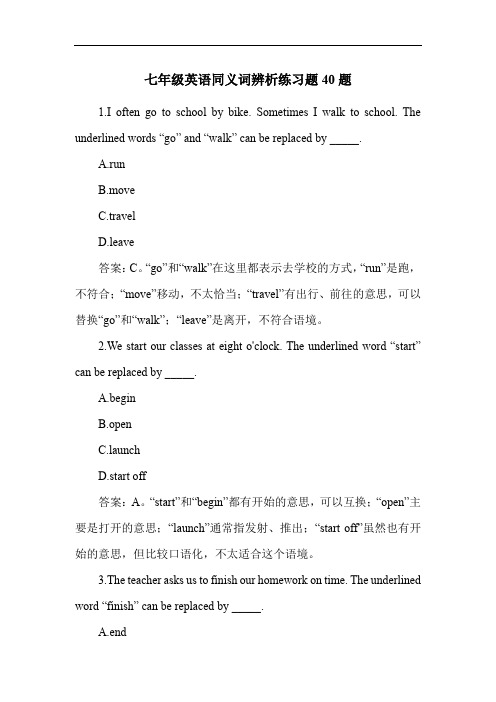
七年级英语同义词辨析练习题40题1.I often go to school by bike. Sometimes I walk to school. The underlined words “go” and “walk” can be replaced by _____.A.runB.moveC.travelD.leave答案:C。
“go”和“walk”在这里都表示去学校的方式,“run”是跑,不符合;“move”移动,不太恰当;“travel”有出行、前往的意思,可以替换“go”和“walk”;“leave”是离开,不符合语境。
2.We start our classes at eight o'clock. The underlined word “start” can be replaced by _____.A.beginB.openunchD.start off答案:A。
“start”和“begin”都有开始的意思,可以互换;“open”主要是打开的意思;“launch”通常指发射、推出;“start off”虽然也有开始的意思,但比较口语化,不太适合这个语境。
3.The teacher asks us to finish our homework on time. The underlined word “finish” can be replaced by _____.A.endpleteC.stopD.close答案:B。
“finish”和“complete”都表示完成的意思,可以互换;“end”更多的是指结束、终止;“stop”是停止;“close”主要是关闭的意思。
4.We have a lot of fun in the playground. The underlined word “have” can be replaced by _____.A.getB.takeC.enjoyD.like答案:C。
同义词辨析填空

同义词辨析填空同义词一直是语言学习中的难点之一,正确使用同义词不仅可以丰富语言表达,还能提升写作的水平。
下面是一些同义词辨析的填空练习,帮助提升你的词汇能力。
1. 他的穿着非常________,总是衬衫西裤搭配。
2. 这幅画的色彩非常________,给人一种欢快的感觉。
3. 他经常________一些兴趣爱好,除了画画还会打乒乓球。
4. 这个问题有点________,我们还需要更多的证据。
5. 北京的冬天很________,气温经常在零下十度左右。
6. 她的笑容非常________,总能为他人带来快乐。
7. 这家咖啡店的环境非常________,音乐和灯光很温馨。
8. 这个建议非常________,可以帮助他们解决困境。
9. 对于这个问题,他的态度非常________,几乎没有任何意见。
10. 学习英语需要________的词汇量,不断积累才能提高口语水平。
11. 她对自己的表演很________,总是很有自信地面对观众。
12. 这段音乐的________很高,需要有很强的技巧才能演奏。
13. 这个电影的情节非常________,令人感到紧张刺激。
14. 他的回答非常________,几乎没有任何犹豫。
15. 他的举止非常________,总是给人一种亲切的感觉。
16. 这个地方的风景非常________,有着浓厚的自然气息。
17. 古代的文人常常饮酒,以________自己的情绪。
18. 这个问题的解决需要________的想象力和创造力。
19. 这个节目的收视率非常________,受到了很多观众的欢迎。
20. 在家庭教育中,父母的影响非常________,决定了孩子的成长。
答案:1. 知性2. 鲜艳3. 发展4. 模糊5. 寒冷6. 迷人7. 宜人8. 极佳9. 冷漠10. 庞大11. 自信12. 难度13. 刺激14. 迅速15. 和蔼16. 优美17. 醉酒18. 丰富19. 良好20. 重大通过这些填空题,希望能帮助你更好地辨析同义词,丰富词汇量,提升写作能力。
中考英语 同义词辨析练习(无答案) 冀教版 试题

近义词辨析1. home, family(1)Her _____ is near our school.(2)He is from a worker's _____.2. in front of, in the front of(1)There is a big tree _____ the house.(2)There is a teacher's desk _____ the classroom.3. some, any(1)There aren't _____ books on the desk.(2)- Will you give me _____ chalk?- All right.4. and, or(1)I have a brother _____ a sister.(2)The clock has no feet _____ legs.5. ones, one's one(1)Lucy has a blue pencil and Lily has a red _____. (2)Those shoes are smaller. I want larger _____. (3)_____ must do _____ duty.6. all, both(1)Her parents are _____ teachers.(2)Twenty boys _____ came at eight o'clock.7. another, the other(1)He has two sisters, One is a teacher, _____ is a nurse. (2)Where are _____ students?(3)Please give me _____ orange.8. the others, others(1)Lei Feng was always ready to help _____.(2)Some are carrying water, _____ are watering the trees.(3)Forty students in our class are boys, _____ are girls.9. Listen to, hear(1)We are _____ him.(2)I'm glad to _____ the news.10. look at, see(1)I didn't _____ any boats on the river.(2)What are they _____?11. go to bed, go to sleep(1)It's time to _____.(2)He was tired. He _____ as soon as he sat down.12. borrow, lend(1)I _____ a book from the library yesterday.(2)You mustn't _____ it to others.13. look for, find(1)I _____ him at home at last.(2)I'm _____ him now. Do you see him?14. take, bring(1)May I _____ this book home?(2)Remember to _____ the box here tomorrow.15. everyone, every one(1)_____ of the books is very useful.(2)_____ likes sports.16. what, how(1)_____ a nice watch it is!(2)_____ hard she works!(3)_____ she missed her daughter!17. each, every(1)_____ student must work hard at his lessons. (2)_____ has his own name.18. too, either(1)You don't know the way. I don't know, _____. (2)Lily often helps him. I, _____, will help him.19. either, any(1)You may take _____ of the two books.(2)Here are three balls . You can take _____ of them.20. neither … nor, either … or(1)_____ Tuesday _____ Wednesday is OK. I'll be free on these days.(2)_____ he _____ I know his address because he moved just a week ago.21. sometimes, sometime, some time (1)They visited our school _____ last year. (2)It took me _____ to do the work.(3)_____ I watch TV in the evening.22. in time, on time(1)I was just _____ for the last bus.(2)The train came in _____.23. quite, quiet(1)Please keep the children _____.(2)I'm _____ busy now.24. arrive, reach(1)She _____ here late last night.(2)The train _____ London at 8:30 p.m., last week.25. on, to, in(1)Shanghai is _____ the east of China.(2)Japan is _____ the east of China.(3)Hebei is _____ the north of Henan.26. few, a few, quite a few(1)The problem is very difficult, _____ students understand it.(2)I got a letter from my friend _____ days ago.(3)I have made _____ friends.27. past, passed(1)He _____ us just now.(2)It's ten _____ ten now.(3)His car drove _____ our school.28. have gone to, have been to(1)- Where is he ? - He _____ Beijing. (2)I _____ the Great Wall twice.29. between, among(1)He was sitting _____ Tom and Mike.(2)He was sitting _____ the classmates.30. in, after(1)He will be back _____ a month.(2)He came back _____ a month.(3)He will e back _____ three o'clock.31. hear of, hear from(1)I haven't _____ him for weeks.(2)I never _____ such a thing.32. such, so(1)He writes _____ well.(2)Don't be in _____ a hurry.(3)He game me _____ beautiful a flower.33. at the end of, by the end of(1)We had exam _____ May.(2)We had learned 1,000 words _____ of last term.34. spend, take(1)Our teacher _____ a lot of money on books. (2)It _____ me two yuan to buy the new book.35. be made of, be made from(1)The desk _____ wood.(2)This kind of paper _____ word.36. put on, wear(1)He _____ a coat and went out. (2)She is _____ a red jacket today.37. find , find out(1)Where did you _____ the pen?(2)I want to _____ who did it.38. by the way, on the way(1)_____, where is Jim? (2)I met him _____ to school.39. in, with(1)The letter was written _____ English.(2)Please write your name here _____ a pen.(3)Please speak _____ a loud voice.40. lonely, alone(1)The old woman lives a _____ life.(2)He doesn't feel _____ when he is left _____.(3)I can do the work _____.41. found, founded(1)The PRC was _____ on October 1, 1949.(2)My lost bike was _____ yesterday.42. spend, pay, take, cost(1)The red blouse _____ the girl forty pounds.(2)Mrs Brown _____ a lot of money on clothes.(3)How much did you _____ for the colour TV set?(4)It _____ her twenty minutes to work out the maths problem. (5)She _____ half an hour in doing her homework.。
英语名词同义词辨析练习题
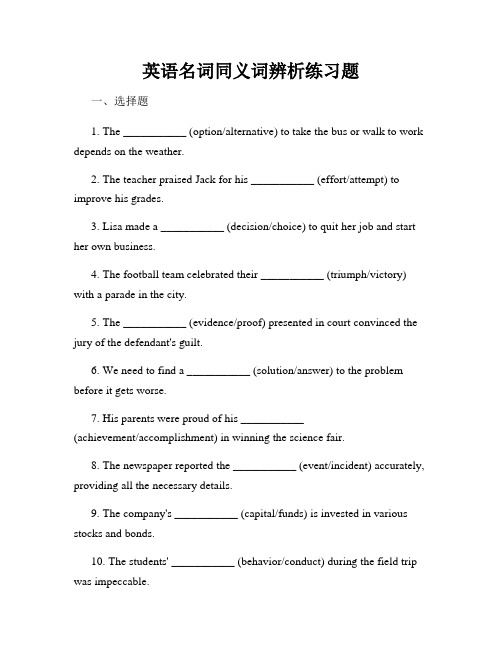
英语名词同义词辨析练习题一、选择题1. The ___________ (option/alternative) to take the bus or walk to work depends on the weather.2. The teacher praised Jack for his ___________ (effort/attempt) to improve his grades.3. Lisa made a ___________ (decision/choice) to quit her job and start her own business.4. The football team celebrated their ___________ (triumph/victory) with a parade in the city.5. The ___________ (evidence/proof) presented in court convinced the jury of the defendant's guilt.6. We need to find a ___________ (solution/answer) to the problem before it gets worse.7. His parents were proud of his ___________(achievement/accomplishment) in winning the science fair.8. The newspaper reported the ___________ (event/incident) accurately, providing all the necessary details.9. The company's ___________ (capital/funds) is invested in various stocks and bonds.10. The students' ___________ (behavior/conduct) during the field trip was impeccable.二、填空题11. The doctor recommended that she take a ___________(vacation/holiday) to reduce stress.12. The teacher asked the students to write a ___________ (composition/essay) about their favorite book.13. The company's ___________ (income/revenue) has increased significantly over the past year.14. He was known for his ___________ (generosity/charity) and willingness to help those in need.15. The ___________ (speed/velocity) of the car was measured by a radar gun.16. The scientist conducted an ___________ (experiment/trial) to test his hypothesis.17. She received a ___________ (scholarship/grant) to study abroad fora year.18. The Olympic Games are a major ___________ (event/occasion) that brings together athletes from around the world.19. The ___________ (environment/habitat) of the rainforest is home toa diverse range of wildlife.20. The new library will provide a ___________ (resource/facility) for students to study and access books.三、解释题21. Define the terms "promotion" and "advancement" and explain the difference between them.22. Compare and contrast the meanings of "evidence" and "proof" in a legal context.23. Discuss the nuances between the words "observation" and "witness" when referring to a crime scene.24. Illustrate the distinction between "salary" and "wage" in terms of employment compensation.25. Elaborate on the similarities and differences between the terms "talent" and "skill" in relation to personal abilities.四、根据上下文选择合适的同义词26. The building was severely damaged in the ___________ (hurricane/typhoon).27. The artist's paintings are known for their ___________ (originality/uniqueness) and creativity.28. The employee was given a ___________ (raise/promotion) for his outstanding performance.29. She received a ___________ (diploma/degree) in psychology from a prestigious university.30. The ___________ (audience/crowd) applauded the performer's exceptional talent.五、句子改错31. The scientist conducted a experiment to test his hypothesis.改为:The scientist conducted an experiment to test his hypothesis.32. They were impressed by the selection of chooses available at the store.改为:They were impressed by the selection of choices available at the store.33. The company's chief executive officer announced a new strategy for increasing income.改为:The company's chief executive officer announced a new strategy for increasing revenue.34. She decided it was time to make a important decision about her future.改为:She decided it was time to make an important decision about her future.35. The success of the project was attributed to the collective effort and achievement of the team members.改为:The success of the project was attributed to the collective effort and accomplishment of the team members.六、完形填空Throughout history, humans have made great advancements 36 various fields. These __37__ have brought about significant __38__ in technology,medicine, and communication. However, these __39__ have also posed challenges and __40__ ethical dilemmas.One of the __41__ areas of development is artificial intelligence (AI). AI is a branch of computer science that focuses on creating systems capable of __42__ tasks that usually require human __43__. AI has already __44__ great progress in areas such as speech recognition and natural language processing. However, the __45__ of AI raises concerns regarding job__46__, privacy, and even the __47__ of humanity.Another __48__ domain of advancement is genetic engineering. Scientists are now able to __49__ genes to enhance desirable traits and eliminate __50__ diseases. While the potential __51__ of genetic engineering are immense, there are also __52__ associated with the __53__ of nature and the __54__ of genetic manipulation.In the realm of communication, the __55__ of social media has revolutionized the way people interact and share information. __56__ platforms such as Facebook, Twitter, and Instagram have __57__ individuals to connect and __58__ with each other on a global scale. However, the__59__ of personal data and the __60__ of misinformation have become major concerns in the digital age.36. A. across B. among C. within D. over37. A. advancements B. progresses C. investments D. experiments38. A. improvements B. problems C. implications D. consequences39. A. achievements B. developments C. discoveries D. inventions40. A. brought about B. faced C. dealt with D. created41. A. stimulating B. challenging C. promising D. flourishing42. A. completing B. performing C. inventing D. solving43. A. skills B. tools C. efforts D. inputs44. A. made B. taken C. conducted D. reached45. A. emergence B. advancement C. implementation D. growth46. A. security B. losses C. opportunities D. replacements47. A. preservation B. extinction C. improvement D. adaptation48. A. significant B. innovative C. potential D. practical49. A. alter B. mutate C. switch D. transform50. A. common B. rare C. chronic D. infectious51. A. consequences B. benefits C. problems D. outcomes52. A. risks B. consequences C. challenges D. rewards53. A. modification B. preservation C. destruction D. investigation54. A. consequences B. feasibility C. morality D. complexity55. A. appearance B. rise C. growth D. dominance56. A. Social B. Virtual C. Digital D. Online57. A. enabled B. encouraged C. prohibited D. hindered58. A. collaborate B. communicate C. isolate D. segregate59. A. protection B. exposure C. collection D. misuse60. A. manipulation B. circulation C. fabrication D. elimination 答案:1. alternative2. effort3. decision4. victory5. evidence6. solution7. achievement8. event9. capital10. behavior11. vacation12. composition13. revenue14. generosity15. speed16. experiment17. scholarship18. event19. environment20. resource21. Promotion refers to the advancement in a person's rank or position within a company or organization, usually as a result of their outstanding performance, skills, or experience. Advancement, on the other hand, refersto progress or development in a person's career or personal life, often associated with achieving higher goals or acquiring new skills or knowledge. The main difference between promotion and advancement is that promotion focuses on the change in status or position, while advancement encompasses a broader sense of progress in different aspects of life.22. Evidence and proof are two terms often used interchangeably in everyday language, but they have distinct meanings in a legal context. Evidence refers to any material or information presented in a court of law to support or prove a fact or point in a case. It can include documents, testimony, or physical objects. Proof, however, refers to the level of certainty or convincingness that evidence provides. It is the establishment or demonstration of the truth or validity of a claim beyond a reasonable doubt. In other words, evidence is the material presented, while proof is the resultor outcome of that evidence being evaluated and accepted as valid.23. Observation and witness are two terms commonly associated with crime scenes and investigations. Observation refers to the act of looking at, perceiving, or noticing something through one's senses. It can involve seeing,hearing, smelling, or feeling something firsthand. A witness, on the other hand, refers to a person who has observed or has knowledge of an event or incident and can provide testimony or information about it. While observation can be done by anyone, a witness is specifically someone who can provide relevant details or evidence related to a specific event, such as a crime.24. Salary and wage are both terms used to refer to the payment or compensation received by an individual for their work or services. However, they have different connotations and applicability. Salary is usually associated with professional or managerial positions and is paid on a monthly or yearly basis. It is often fixed and predetermined, regardless of the number of hours worked. Wage, on the other hand, is more commonly used for hourly or waged positions, where the payment is based on the number of hours worked or the amount of output produced. Wages are typically paid on a weekly or bi-weekly basis and can vary depending on factors such as overtime or productivity.25. Talent and skill are often used interchangeably to describe personal abilities or aptitudes. However, they have distinct meanings and nuances. Talent refers to a natural, innate ability or aptitude for a particular activity or field. It is something that comes naturally or effortlessly to a person. Skill, on the other hand, refers to knowledge, expertise, or competence acquired through practice, training, or experience. It is something that is developed or honed over time. While talent can provide a foundation or advantage in acquiring a skill, skill is the result of effort, dedication, and learning.。
- 1、下载文档前请自行甄别文档内容的完整性,平台不提供额外的编辑、内容补充、找答案等附加服务。
- 2、"仅部分预览"的文档,不可在线预览部分如存在完整性等问题,可反馈申请退款(可完整预览的文档不适用该条件!)。
- 3、如文档侵犯您的权益,请联系客服反馈,我们会尽快为您处理(人工客服工作时间:9:00-18:30)。
贫、穷这两个字都有“景况不好”的意思。
“贫”的反义词是“富”,指缺乏衣、食、财。
如“蜀之鄙有二僧,其一贫,其一富”(彭端淑《为学》)。
“穷”的反义词是“通”或“达”。
如“穷则独善其身,达则兼济天下”(《孟子·尽心上》)。
“穷”除了上述义外,还作“尽”讲,如“子子孙孙无穷匮也”(《列子·汤问》)疾、病“疾”,常指一般的生病。
如“君之疾在腠理,不治将恐深”(《韩非子·喻老》)。
“疾”也表示快,这个意义今天仍用,如“大声疾呼”。
“病”,生病,常指病得很重。
如“(君之病)在骨髓,臣是以无请也”(出处同前)。
饥、饿“饥”指一般的肚子饿,与“饱”相对。
如“饥渴而顿踣”(柳宗元《捕蛇者说》)。
“饿”指严重的饥饿,指没有饭吃而受到死亡的威胁。
如“家有常业,虽饥不饿”(《韩非子·饰邪》)。
盗、窃“窃”是指“盗窃”,偷东西。
如“窃货日益”(《苟子·修身》)。
“盗”相当于今天的“贼”;古书中的“盗”,多是古代统治阶级对起义的奴隶或农民的称呼。
如“岁凶荒,人饥为盗,河南尤甚”(《旧唐书·黄巢传》)。
“窃”除指“偷”以外,还表示“偷偷地,暗中”,如“窃载与之齐”(《史记·孙膑列传》)。
荫、蔽二者都有“遮住”义,但是范围大小差别很大。
“荫”只能从上遮住,而且指遮住阳光。
如“树林荫翳,鸣声上下”(欧阳修《醉翁亭记》)。
而“蔽”遮的范围更大,可以从前后左右遮住,也可以从上遮住。
如“项伯亦以身翼蔽沛公”(《史记·项羽本纪》)。
诽、谤这两个词与“讥”都是指责别人的过错或短处,但是它们之间有一定的差别。
“诽”是背地里议论、嘀咕,如“不诱于誉,不恐于诽”(《荀子·非十二子》)。
“谤”一般指公开地指责。
如“厉王虐,国人谤王”(《国语·周语上》)。
而“讥”则是微言讽刺。
购、买“购”是指重赏征求。
如“太宗尝出御府金帛购求王羲之书迹”(《旧唐书·褚遂良传》)。
“买”指拿钱换东西。
古代“购”和“买”不是同义词,“购”的东西往往不是商品,跟“买”的性质不相同。
商、贾(gǔ)——这两个词都指做买卖的行为和做买卖的人,但所指对象并不完全相同。
“商”指往来行商,“贾”指设店售货。
《白虎通·商贾》:“行曰商,止曰贾。
商之为言章也,章其远近,度其有无,通四方之物,故谓之商。
”《周礼·地宫·司市》:“以商贾阜货而行布。
”郑玄注:“居卖物曰贾。
”《说文》:“贾,坐售卖也。
”由于所指并不完全相同,因此古代有“行商坐贾”之说。
门、户——这两个词都指房屋的出入口,但所指对象有异:《说文》:“门,闻也。
从二户,象形。
”“户,护也。
半门曰户,象形。
”《玉篇》:“门,人所出入也。
在堂房曰户,在区域曰门。
”“户,所以出入也。
一扉曰户,两扉曰门。
”由上述材料可知,“门”和“户”的差别是:“门”是两扇的,“在区域”,即大门;“户”是一扇的,“在堂房”,即房门。
书、籍——这两个词都是指“书本”。
但“书”偏重于文字内容,“籍”偏重于簿册档案。
《说文解字·叙》:“着于竹帛谓之书,书者,如也。
”《正字通》:“凡载籍谓之书。
”《说文》:“籍,簿书也。
”《释名》:“籍,籍也,所以籍疏人名户口也。
”作动词用时,“书”强调“书写”,“籍”强调“登记”。
府、库——这两个词都指收藏物品的库房,但“府”指收藏文书财物的库房,“库”指收藏兵车武器的库房。
《说文》:“府,文书藏也。
”“库,兵车藏也。
”《尚书·大禹谟》:“地平天成,六府三事允治。
”孔颖达疏云:“府者,藏财之处。
”《礼记·曲礼下》:“在库言库。
”郑玄注云:“库谓车马兵甲之处也。
”《吕氏春秋·分职》:“叶公入,乃发太府之货(财物)与众,出高库之兵(武器)以赋民。
”句中“府”、“库”的差异十分清楚。
哭、泣、号、啼——这四个词都指“哭”,但是其方式状态不同。
“哭”指有声的哭,《说文》:“哭,哀声也。
”《论语·先进》:“颜渊死,子哭之恸。
”《史记·高祖本纪》:“汉王闻之,袒而大哭。
”“泣”一般指无声或低声的哭,《说文》:“泣,无声出涕曰泣。
”段玉裁注:“‘哭’下曰:‘哀声也。
’其出涕不待言,其无声出涕者为泣。
此哭、泣之别也。
”“号”的本义是高声呼叫,引申指带着言词诉说的呼号,《汉书·刘向传》:“而号曰:‘骨肉复归于土,命也。
’”颜师古注:“号,谓哭而且言也。
”《颜氏家训·风操》:“礼以哭有言者为号。
”《庄子·养生主》:“老聃死,秦失吊之,三号而出。
”“啼”指放声大哭,悲痛之声甚于“哭”,《庄子·骈拇》:“枝于手者,龁之则啼。
”(“枝于手”指大拇指旁歧生一指,成六指;“龁”是“咬”、“咬掉”之义。
)观、察、看、望——这四个词都有“看”义,但“看”的方式不同。
“观”指有目的地细看,《说文》:“观,谛视也。
”段玉裁注:“审谛之视也。
”《谷梁传》曰:“常事曰视,非常曰观。
”《左传·僖公二十三年》:“(公子重耳)及曹。
曹共公闻其骈胁,欲观其裸。
浴,薄而观之。
”韩愈《答刘正夫书》:“夫百物朝夕所见者,人皆不注视也。
及睹其异者,则共观而言之。
”“察”指翻来覆去细细审看,力图看出究竟,《说文》:“察,覆也。
从宀、祭。
”徐锴《说文系传》:“察,覆审也。
从宀,祭声。
”段玉裁注:“从宀者,取覆而审之;从祭为声,亦取祭必详察之意。
”《左传·庄公十年》:“小大之狱,虽不能察,必以情。
”《孟子·梁惠王上》:“明足以察秋毫之末,而不见舆薪。
”“看”的本义是以手加额遮目而望,《说文》:“看,睎也。
从手下目。
”桂馥《说文义证》:“《九经字样》:‘凡物见不审,则手遮目看之,故看从手下目。
’”徐锴《说文系传》:“以手翳目而望也。
”“望”指向高处、远处看,《释名·释姿容》:“望,茫也,远视茫茫也。
”《玉篇》:“望,远视也。
”《诗经·卫风·河广》:“谁谓宋远跂予望之。
”《左传·庄公十年》:“吾视其辙乱,望其旗靡,故逐之。
”执、秉、操、持、握——这几个词都表示用手拿,但“拿”的特点不同。
“执”的本义是拘捕罪人,引申为“拿”,强调把东西拿紧握牢,勿使丢失。
如:《左传·成公十六年》:“文子执戈逐之。
”《诗经·邶风·击鼓》:“执子之手,与子偕老。
”“秉”的本义是“禾束”,“从又持禾”会意,引申为“拿”,它的特点是只表示用手拿,不强调是否拿得紧,如《诗经·邶风·简兮》:“左手执龠,右手秉翟。
”(龠指舞龠,三尺长、六个孔的管状乐器;“翟”指作舞具的山鸡羽毛。
)“操”的本义是“把持”,即用手抓住,其特点是强调拿得稳,掌握得熟练。
《左传·襄公三十一年》:“今吾子爱人以政,犹未能操刀而使割也,其伤实多。
”由此引申出“操纵”、“驾驭”之义,重在“稳”、“熟”,《庄子·达生》:“津人操舟若神。
”“持”所表示的“拿”义,强调托扶、保持不变,如《论语·季氏》:“危而不持,颠而不扶,则将焉用彼相矣。
”《庄子·渔父》:“左手据膝,右手持颐(托着下巴)。
”其引申义“掌管”,仍强调“维护”、“保持”,如《乐府诗集·陇西行》:“健妇持门户,一胜一丈夫。
”“握”的词义特征,是强调把较小的东西握在手掌之中,如《诗经·小雅·小宛》:“握粟出卜,自何能谷。
”郑玄笺:“持粟行卜,求其胜负,从何能得生。
”《楚辞·九章·抽思》:“怀瑾握瑜兮,穷不知所示。
”“粟”、“瑜”均是小物,故用“握”字。
眷、顾——这两个词都有“回头看”的意思,但程度不同。
“顾”指一般性的回头看,《说文》:“顾,还视也。
”《诗经·桧风·匪风》:“顾瞻周道,中心怛矣。
”毛亨传:“回首曰顾。
”“眷”指深深地回头看,《说文》:“眷,顾也。
”段玉裁注:“顾者,还视也;眷者,顾之深也。
顾止于侧而已,眷则至于反。
”《诗经·大雅·皇矣》:“乃眷西顾,此维与宅。
” 周、比——这两个词都有“与人亲密”之义,但“周”是褒义词,“比”是贬义词。
“周”的本义是“密也”,从用口会意,引申为“亲密”,表示人与人的关系;“比”的本义是“密也”,从二人会意,专指人与人的关系亲近。
《论语·为政》:“君子周而不比,小人比而不周。
”何晏注:“孔(安国)曰:‘忠信为周,阿党为比。
’”杀、弑——这两个词都有“杀死”之义,但“杀”重在叙述事实,是中性词;“弑”是臣子杀君,儿子杀父,重在“正名”,古代是贬义词。
《说文》:“杀,戮也。
”《论语·卫灵公》:“志士仁人,无求生以害仁,有杀身以成仁。
”《史记·项羽本纪》:“项伯杀人,臣活之。
”《说文》:“弑,臣杀君也。
”段玉裁注:“述其实则曰杀君,正其名则曰弑君。
《春秋》,正名之书也,故言弑不言杀;三传,述实以释经之书也,故或言杀、或言弑。
”《周易·坤卦》:“臣弑其君,子弑其父,非一朝一夕之故,其所由来者渐矣。
”《左传·宣公十八年》:“凡自内虐其君曰弑,自外曰戕。
”征、伐、侵、袭——这四个词都指发动军事进攻,但词义的感情色彩不同。
“征”是褒义词,用于“上(天子)”攻“下(诸侯)”、“有道”攻“无道”。
《尚书·胤征》孔安国传:“奉辞伐罪曰征。
”孔颖达疏:“奉责让之辞,伐不恭之罪,名之曰征。
”《墨子·七患》:“库无备兵,虽有义不能征无义。
”“伐”本是中性词,指敲钟击鼓公开宣战,《诗经·商颂·殷武》:“奋伐荆楚。
”郑玄笺:“有钟鼓曰伐。
”《孟子·告子下》:“是故天子讨而不伐。
”焦循正义:“讨者,上讨下也。
伐者,敌国相征伐也。
”“伐”常同“征”连用,因此也发展成褒义词,如柳宗元《封建论》:“历于宣王,挟中兴复古之德,雄南征北伐之威。
”“侵”是贬义词。
“侵”指不宣而战,侵犯别国,如《左传·庄公二十九年》:“夏,郑人侵许。
”《左传·僖公四年》:“四年春,齐侯以诸侯之师侵蔡。
蔡溃,遂伐楚。
”句中“侵蔡”是不宣而战,“伐楚”是公开征讨。
“袭”则是中性词,指秘密偷袭,乘人不备以轻兵锐卒发起突然袭击。
《左传·庄公二十九年》:“凡师有钟鼓曰伐,无曰侵,轻曰袭。
”“袭”也用于贬义,如《左传·隐公元年》:“大叔完聚,缮甲兵,具卒乘,将袭郑。
夫人将启之。
” 抑、按——这两个词都表示用手向下压,但轻重程度不同,“抑”的语意重于“按”。
《说文》:“抑,按也。
”“按,下也。
”“按”的词义重心在“下”,即把原来高的压低,如《史记·绛侯周勃世家》:“壁门士吏谓从属车骑曰:‘将军约,军中不得驱驰。
